Vladimir Putin: Russia's action man president
- 4 hours ago
- Europe
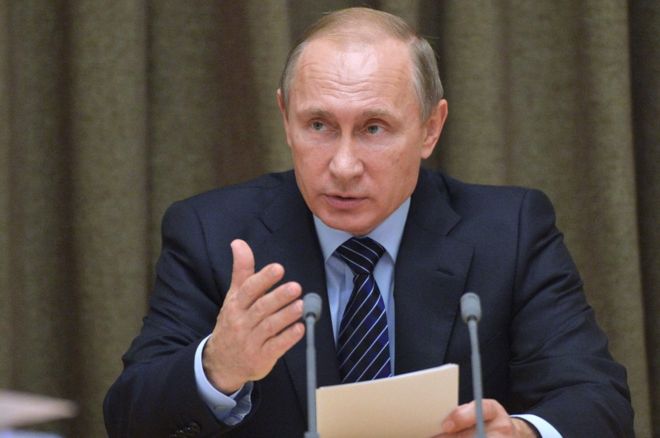 EPA
EPA
Russian President Vladimir Putin, a judo black belt, appears to symbolise two of the martial art's key qualities - guile and aggression.
His swift military interventions in Ukraine - annexing Crimea in March 2014 - and Syria - bombing anti-government rebels this year - stunned many observers.
Mr Putin, 63, has made no secret of his determination to reassert Russian power, after years of perceived humiliation by the US and its Nato allies.
In 2005 he famously called the collapse of the Soviet Union "the biggest geopolitical catastrophe of the [20th] Century".
He has spoken bitterly about Nato's expansion after the Cold War up to Russia's borders.
He sees himself as a defender of ethnic Russians' rights in former Soviet republics, including in Nato's Baltic members Estonia, Latvia and Lithuania.
It is well documented that he grew up in a tough, communal housing block in Leningrad - now St Petersburg - and got into fights with local boys who were often bigger and stronger. That drove him to take up judo.
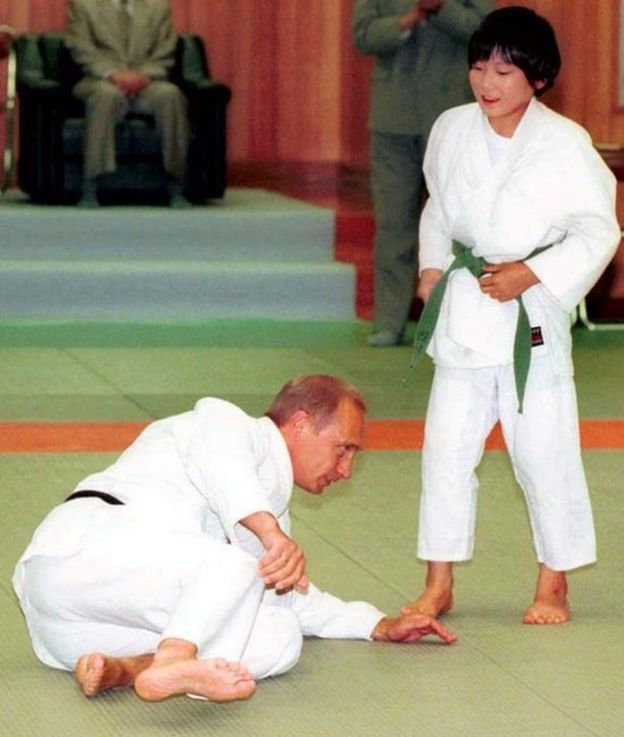 AP
AP'Throw first punch'
According to the Kremlin website, Mr Putin wanted to work in Soviet intelligence "even before he finished school".
"Fifty years ago the Leningrad street taught me a rule: if a fight is inevitable you have to throw the first punch," Mr Putin said in October 2015.
It is better to fight "terrorists" in Syria, he explained, than to wait for them to strike in Russia.
He also used the crude language of a streetfighter when defending his military onslaught against separatist rebels in Chechnya, vowing to wipe them out "even in the toilet".
The mainly Muslim North Caucasus republic was left devastated by heavy fighting in 1999-2000, in which thousands of civilians died.
For Mr Putin, Georgia became another Caucasus flashpoint.
In 2008 his forces routed the Georgian army and took over two breakaway regions - Abkhazia and South Ossetia.
It was a very personal clash with Georgia's then pro-Nato President, Mikheil Saakashvili. And it showed Mr Putin's readiness to undermine pro-Western leaders in former Soviet states.
Vladimir Putin: From spy to president
- Born 7 October 1952 in Leningrad (now St Petersburg)
- Studies law and joins KGB after university
- Serves as a spy in communist East Germany - some ex-KGB comrades later get top state posts in Putin era
- 1990s - top aide to St Petersburg mayor Anatoly Sobchak, who had previously taught him law
- Enters Boris Yeltsin's Kremlin in 1997, made chief of Federal Security Service (the FSB - main successor of the KGB), then prime minister
- New Year's Eve, 1999 - Yeltsin quits and names him acting president
- Easily wins presidential election in March 2000.
Mr Putin appears to relish his macho image, helped by election stunts like flying into Chechnya in a fighter jet in 2000 and appearing at a Russian bikers' festival by the Black Sea in 2011.
The Night Wolves bikers' gang played a prominent role in whipping up patriotic fervour during Russia's takeover of Crimea in 2014.
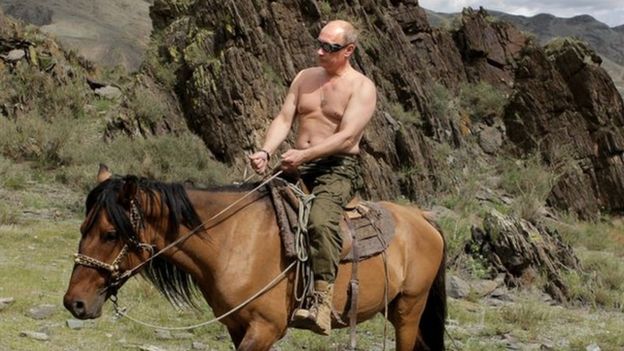 AFP
AFP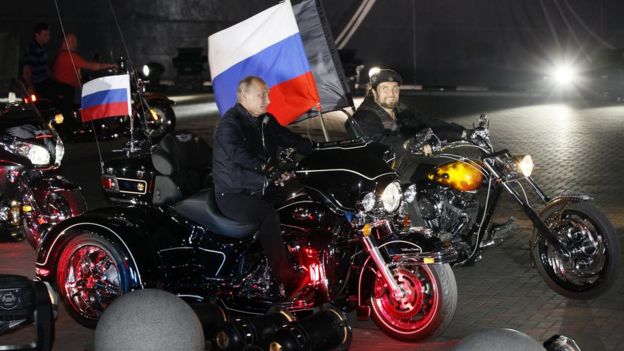 AFP
AFP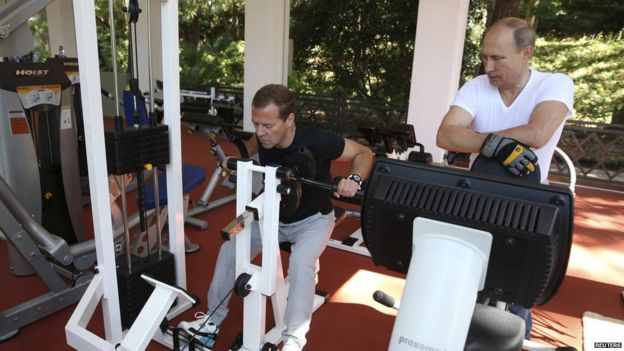 Reuters
Reuters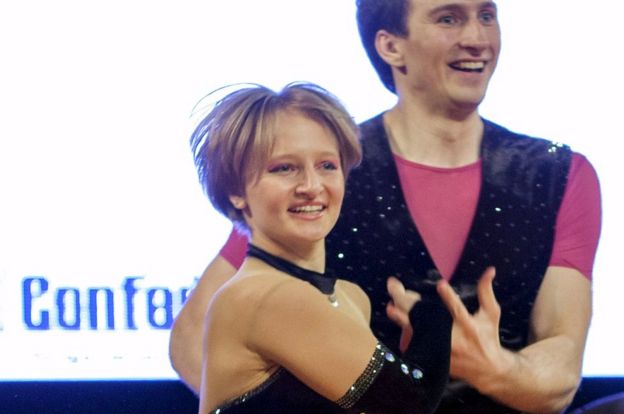 Reuters
Reuters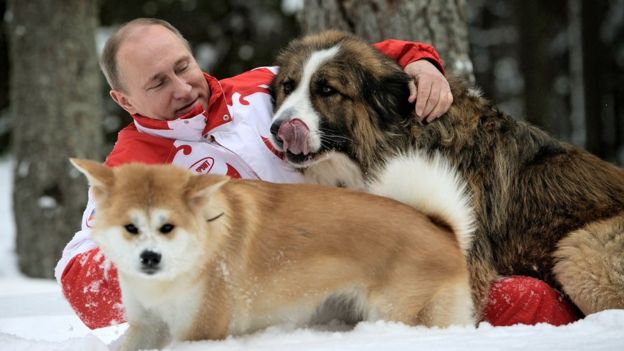 AFP
AFP
But Mr Putin has also shown a gentler side on Russian state media, cuddling his dogs and helping to care for endangered Amur tigers.
He is a proud former officer of the Soviet secret police, the KGB, with an entourage largely drawn from that old Soviet security elite.
The 2014 Winter Olympics in Sochi was a lavish showcase for the Putin era: it cost Russia an estimated $51bn (£34bn) - the highest price tag for any Olympics.
He is passionate about ice hockey, like judo - and state TV has shown his skills on the ice.
Liberals pushed out
Despite his long reign President Putin's approval ratings are still above 80%, Russian media report - the kind of popularity that most Western leaders can only dream of.
Mr Putin's brand of patriotism dominates Russia's media, so those ratings do not give the whole picture. But dissenters do struggle to be heard.
He was re-elected president in 2012 for a third, six-year term in the Kremlin. Even in the previous four years, as prime minister under President Dmitry Medvedev, he was clearly holding the levers of power.
In his first two terms as president Mr Putin was buoyed by healthy income from oil and gas - Russia's main exports.
Living standards for most Russians improved. There was a new sense of stability and national pride. But the price, in the opinion of many, was the erosion of Russia's fledgling democracy.
In the run-up to his re-election, Russia was gripped by the biggest anti-government protests since Soviet times.
Protest leaders have been jailed or otherwise marginalised - including the most prominent dissident, Alexei Navalny. He made a name for himself by exposing rampant corruption, labelling Mr Putin's United Russia as "the party of crooks and thieves".
Early on Mr Putin set about marginalising liberals, often replacing them with more hardline allies or neutrals seen as little more than yes-men.
Yeltsin's favourites such as Boris Berezovsky and Vladimir Gusinsky - businessmen who grew rich in the chaos of the first privatisations - ended up as fugitives living in exile abroad.
Economic slump
Since the 2008 global financial crisis Mr Putin has struggled with an anaemic economy, hit by recession and more recently a plunge in the price of oil. Russia lost many foreign investors and billions of dollars in capital flight.
In 2014 the rouble slumped to its weakest rate against the dollar since 1998.
The conflict in Ukraine, which erupted in November 2013, has also hurt the Russian economy.
Mr Putin's support for pro-Russian separatists in Crimea and eastern Ukraine triggered far-reaching Western sanctions, targeting powerful figures close to him, as well as Russian banks, arms firms and the energy sector.
He hit back with a ban on most imported Western food and drink, and the bitter tit-for-tat dispute caused the biggest diplomatic freeze since the end of the Cold War.
Russia ceased to be a "strategic partner" of the EU. Mr Putin poured scorn on the new pro-Western government in Ukraine, bitterly denouncing what he called the "coup" which forced pro-Moscow President Viktor Yanukovych to flee to Russia.
The Kiev government and Western leaders said Russia was clearly sending heavy weapons and troops to eastern Ukraine - and Mr Putin denied that, while admitting that Russian "volunteers" were helping the rebels.
Resurgent Church
Mr Putin's relations with the UK were already frosty because of the 2006 radioactive poisoning of anti-Putin campaigner Alexander Litvinenko in London.
Agents of the Russian state were accused of murdering Litvinenko, a former Russian secret service agent. Andrei Lugovoi - wanted by British police over the murder - became a Russian MP in 2007, with parliamentary immunity.
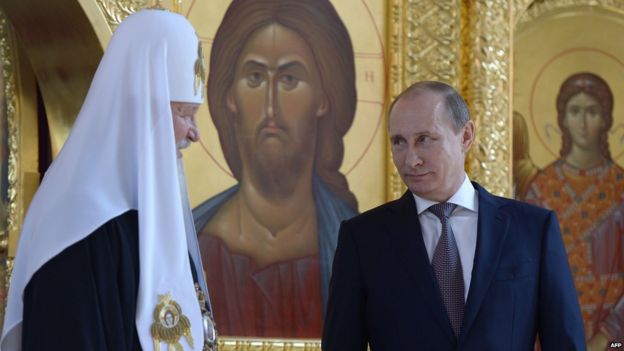 AFP
AFP
International concern about human rights in Russia grew with the jailing of oligarch Mikhail Khodorkovsky, once one of the world's richest billionaires, and of anti-Putin activists from the punk group Pussy Riot.
Mr Putin's third term has been marked by conservative Russian nationalism. It has strong echoes of tsarist absolutism, encouraged by the Orthodox Church.
The Church denounced Pussy Riot and supported a ban on groups spreading gay "propaganda" among teenagers.
Any non-governmental organisations (NGOs) receiving foreign funding were ordered to register as "foreign agents" - a label echoing notorious Soviet-era spy mania.
Wealthy elite
Mr Putin was once described as a workaholic by the mother of his two daughters, Lyudmila.
After nearly 30 years of marriage, the couple jointly announced they were divorcing in 2013. "Vladimir Vladimirovich is completely drowned in work," Mrs Putin said.
It was a rare glimpse into Mr Putin's family life. He has kept his two daughters and financial affairs well shielded from publicity.
But according to a recent Reuters news investigation, his younger daughter, Katerina, is thriving in academia, has a top administrative job at Moscow State University and performs in acrobatic rock 'n' roll competitions.
Reuters says her name is Tikhonova and she is the partner of Kirill Shamalov, son of a wealthy, longstanding Putin associate, Nikolai Shamalov.
The elder Putin daughter, Maria, is also an academic, specialising in endocrinology.
Reuters found that several other powerful figures close to Mr Putin - often ex-KGB - also have successful children in lucrative management jobs.
Alexei Navalny called it a "neo-feudal system" that looks after a small, privileged class.

ไม่มีความคิดเห็น:
แสดงความคิดเห็น